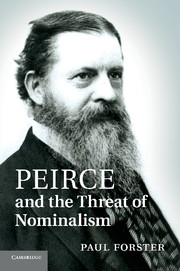Book contents
- Frontmatter
- Contents
- Preface
- List of abbreviations
- 1 Nominalism as demonic doctrine
- 2 Logic, philosophy and the special sciences
- 3 Continuity and the problem of universals
- 4 Continuity and meaning: Peirce's pragmatic maxim
- 5 Logical foundations of Peirce's pragmatic maxim
- 6 Experience and its role in inquiry
- 7 Inquiry as self-corrective
- 8 Theories of truth: Peirce versus the nominalists
- 9 Order out of chaos: Peirce's evolutionary cosmology
- 10 A universe of chance: foundations of Peirce's indeterminism
- 11 From inquiry to ethics: the pursuit of truth as moral ideal
- Bibliography
- Index
Preface
Published online by Cambridge University Press: 28 April 2011
- Frontmatter
- Contents
- Preface
- List of abbreviations
- 1 Nominalism as demonic doctrine
- 2 Logic, philosophy and the special sciences
- 3 Continuity and the problem of universals
- 4 Continuity and meaning: Peirce's pragmatic maxim
- 5 Logical foundations of Peirce's pragmatic maxim
- 6 Experience and its role in inquiry
- 7 Inquiry as self-corrective
- 8 Theories of truth: Peirce versus the nominalists
- 9 Order out of chaos: Peirce's evolutionary cosmology
- 10 A universe of chance: foundations of Peirce's indeterminism
- 11 From inquiry to ethics: the pursuit of truth as moral ideal
- Bibliography
- Index
Summary
Charles Peirce (1839–1914) never completed a philosophical treatise and his extant writing seems fragmentary. But this is not because he failed to work out detailed connections among the diverse aspects of his thought. He was nothing if not methodical, and his aim from the beginning was to construct a systematic and exact philosophy. Certainly his writings are often programmatic, at times sketchy, but one should not expect short series of papers, critical notices and dictionary entries, which Peirce's published work comprises, and lecture notes, letters and private reflections, which make up the rest of his writings, to substitute for a thorough philosophical work. His manuscripts provide only glimpses of a mind labouring on intricate problems, the content and force of which derive from the grand theoretical design that inspired them.
Peirce's philosophical system defies easy classification, even allowing for the evolution of his thought. Early commentators were no doubt hasty in concluding that he has no consistent philosophical orientation, but they were understandably perplexed by his penchant for confuting time-worn categories. To this day there is no consensus on whether his attraction to naturalism takes precedence over his transcendentalism, whether his commitment to holism trumps his distinction between form and content and whether his version of idealism weakens (for better or worse) his claim to be a robust realist.
- Type
- Chapter
- Information
- Peirce and the Threat of Nominalism , pp. ix - xiPublisher: Cambridge University PressPrint publication year: 2011



